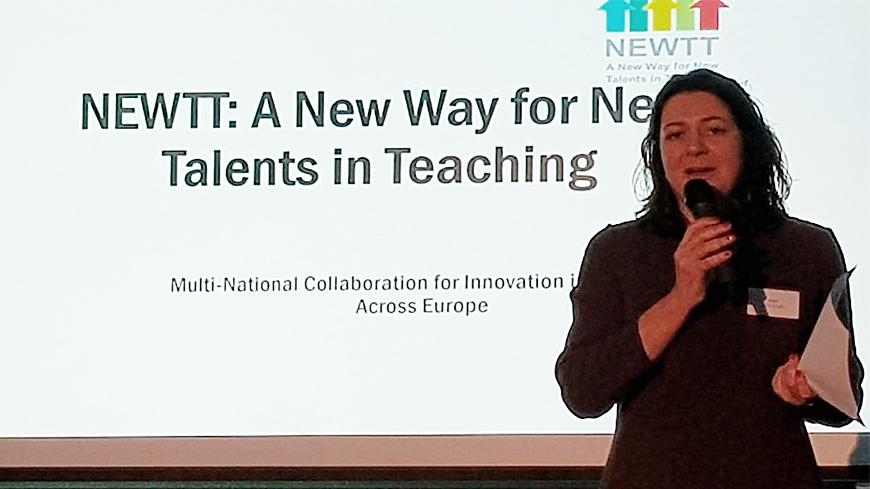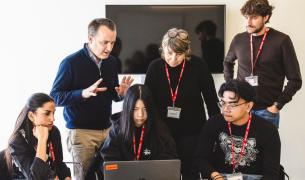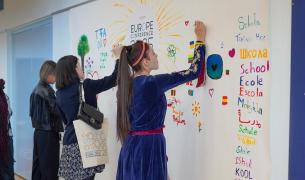Erasmus+ NEWTT Project Demonstrates Innovation and Teacher Support are Key to Addressing EU Education Challenges

This week, European Union officials, academics, educators, policy makers and civil society organizations gathered in Brussels for an event marking the conclusion of the first policy testing project under the EU Erasmus+ initiative, which supports education, training, youth, and sport. The project A New Way for New Talents in Teaching (NEWTT) was led by a consortium of 15 partners across six EU Member State countries, including Teach For All network partners Teach For Bulgaria, Teach For Austria, Iespējamā Misija - Mission Possible Latvia, Teach For Romania, and Empieza por Educar (Spain), and Teach For All’s global organization.
NEWTT was developed to address a series of challenges that education systems across the European Union are facing. As an alternative pathway into teaching, the project enabled the recruitment of motivated and outstanding graduates and professionals from diverse backgrounds into a career in education. These pathways offer training that is complementary to more traditional teacher training programs. Like traditional programs, alternative pathways are designed to improve the quality of the training and support that teachers and schools receive across the national education systems, albeit through a more practical and hand-on training approach.
Panel discussions focused on the outcomes of the NEWTT project, its contribution to the success of the Erasmus+ initiative 2014-2020, and its implications for EU policy. Consortium participants and others discussed how alternative pathways can successfully complement traditional teacher training programs and thus improve educational outcomes for children, especially those from the least advantaged backgrounds.
Themis Christophidou, the European Commission’s Director-General for Education, Youth, Sport and Culture, welcomed guests, and Eva Maydell, a Bulgarian Member of the European Parliament, gave the opening remarks, noting that NEWTT brought together 15 partners to define innovative, value-added ways to bring new talent into teaching.
Professor Herman Abs from the University Duisberg-Essen in Germany presented the results of the project (soon to be available in an upcoming evaluation report), which found that:
- NEWTT attracted promising university graduates and accomplished professionals who would have been unable and/or unwilling to enter the teaching profession through traditional teacher training pathways
- NEWTT diversified the school teaching workforce by attracting people from a broader range of academic backgrounds, experiences and expertise
- During their two-year teaching commitment, NEWTT participants attained as much or more knowledge and competency as the traditionally trained teachers in the control group
- Schools welcomed participants and saw them as valuable resources to address growing challenges in the classrooms and communities where they worked
- During NEWTT, participants became increasingly positive about the prospect of remaining in the classroom beyond the project term
- NEWTT successfully addressed the needs of schools in under-resourced communities by providing them access to a diverse set of teachers who proved to be knowledgeable, competent, and engaged
Teachers who participated in NEWTT called on school leaders, universities and policy makers to address the challenges facing education by focusing on: 1) the position of teachers in society; 2) placing more confidence in teachers so that they aren’t tied down to outdated curricula that don’t adequately prepare students for the 21st century; 3) a more competitive selection process for teachers; and 4) an outdated curricula in pedagogical training.
In her closing remarks, Denitsa Sacheva, Deputy Minister of Education & Science of the Republic of Bulgaria, explained that the government of Bulgaria is investing heavily in education and teacher training, and is currently implementing new policies to stimulate alternative pathways.
The NEWTT project design was based on the shared approach of the Teach For All network. While the policy-testing project was conducted over a period of three years, and measured the experience of its participants over two years, Teach For All’s approach finds that across its global network 72% of participant teachers stay in education or continue to work in low-resource communities after completing their two year commitment.
The European Commission has made it a priority to address educational challenges across the EU. With the continuation of this priority within the education and skills agenda for the period 2021-2017, the success of this project can be used to inform future education policies among all EU Member States, while also highlighting how civil society organizations can bring innovation into the education sector and contribute to system progress.
Teach For All is thrilled to have been part of this project and looks forward to seeing how these positive results will be reflected in future education and training policies in the EU.
Learn more about NEWTT.


